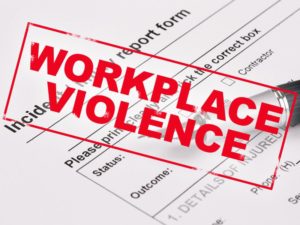 Workplace violence is “violence or the threat of violence against other workers” and can manifest itself in a verbal threat, physical assault, or even an act of homicide. Job-related homicide is one of the leading causes of workplace deaths and some 2 million workers’ become victims of workplace violence each year. And while any industry can be affected, those who are in healthcare, retail, and service industries are at a higher risk because of increased public contact. Employers should have a zero-tolerance policy in place to protect workers from workplace violence, but if you should become a victim, it is important you are informed and know your rights.
Workplace violence is “violence or the threat of violence against other workers” and can manifest itself in a verbal threat, physical assault, or even an act of homicide. Job-related homicide is one of the leading causes of workplace deaths and some 2 million workers’ become victims of workplace violence each year. And while any industry can be affected, those who are in healthcare, retail, and service industries are at a higher risk because of increased public contact. Employers should have a zero-tolerance policy in place to protect workers from workplace violence, but if you should become a victim, it is important you are informed and know your rights.
4 Types of Workplace Violence
- A crime by a stranger to the employee
- A crime by a customer of the employer
- A crime by a fellow employee
- A crime by someone with a personal relationship with employee and intends them as the victim (domestic violence)
Risk Factors of Workplace Violence
Here are factors that can increase a workers’ risk for workplace violence.
- Contact with the public
- Exchange of money
- Delivery of goods, services, or passengers
- Working alone or in small numbers
- Working in high-crime area
- Working late at night or early morning hours
- Working in community based-settings.
Preventing workplace violence
There are certain measures that employers can take to prevent workplace violence and help ensure the safety of their employees.
- Prevent harassment with a written policy
- Have open and effective lines of communication
- Make sure there is a “zero-tolerance” policy attached to violence in the workplace
- Increase awareness through employee training
- Encourage prompt reporting of any incidents
- Prevent simple conflicts from snowballing into violence
Does Georgia’s workers’ compensation insurance cover workplace violence?
In Georgia, whether workers’ comp will cover workplace violence is entirely situational and the circumstances and origins must be examined. If you are filing a claim involving assault you must demonstrate fault, so gathering evidence is a crucial part the process. This means police reports, recordings, witness accounts, etc.—anything that will demonstrate liability. For workplace violence to be compensable it must arise in the injured workers employment. This means, not just during working hours and while engaged in work duty, but also that the assault was not “personal” in nature. For example, let’s say an employee’s spouse thought he or she was cheating on him with a coworker. So, the spouse attacks the coworker causing injury. It is likely that would be personal in nature and not deemed compensable. The attack must be work-related or secondary to a work dispute to be covered. Also, the injured employee filing the claim cannot have purposely provoked or been the instigator of the attack. In general, the facts of each case will determine whether a claim is appropriate, and it often takes exhaustive investigative techniques of sorting through witness accounts and trying to get every side of the story. Finding out the reason for the incident is significant and a huge part of the process. For this reason alone, it is advisable to consult with the highest quality workers’ compensation attorney available.
Workplace violence may happen anywhere, at any time, to any person—and it can also be instigated by absolutely anyone. Employee safety is of paramount importance to each industry as it is an employer’s duty to make sure their staff feels safe coming to work each day.
